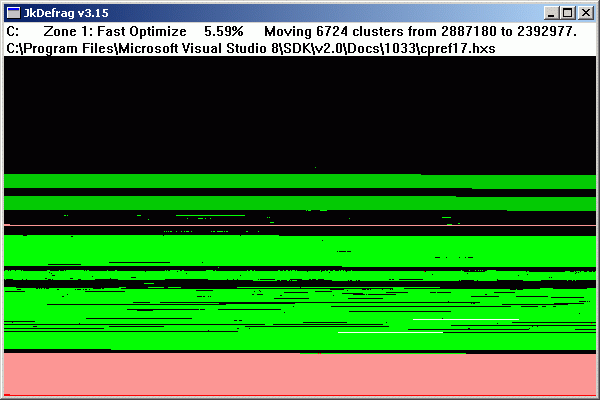It’s 11 o’clock A.M. do you know where your hard disk fragments are?
Computer experts agree, defragmenting your computer on a regular basis helps to maintain hard disk speed and stability. The problem is most people don’t do it. Why? I don’t know, maybe it’s because the built in defragmenter tools are slow and cumbersome to use. Maybe it’s that the comp-geeks aren’t screaming the virtues of disk defragmenting loud enough.
Regardless if you want to squeeze the most out of what you have, I suggest you defragment your drives. Like Mayor Richard J. Daley would say “Defragment early and often”. ![]()

It just so happens that Lockergnome tells us about an open source hard disk optimizer called JkDefrag v3.16 that might make the job a bit easier.
Free (released under the GNU General Public License) disk defragment and optimize utility for Windows 2000/2003/XP/Vista/X64. Completely automatic and very easy to use, fast, low overhead, with several optimization strategies, and can handle floppies and USB disks/sticks. Included are a Windows version, a commandline version (for scheduling by the task scheduler or for use from administrator scripts), a screensaver version, a DLL library (for use from programming languages), and versions for Windows X64.
I normally use Perfectdisk for my hard disk optimization because it is fast, thorough, pretty and runs in the middle of the night, but I will test JkDefrag on some of my systems that don’t have Perfectdisk installed.


{ 16 comments }
Good post. Personally I like PerfectDisk for defragging because it consolidates the free space as well.
Ahh yes Jon, I forgot about that feature. Overall PerfectDisk is a better product for computer perfectionists. JKdefrag is a good entry level defrag tool that might help get some of the people who DON’T do it to start.
Friends don’t let friends drive not defragged .
sorry, it’s early over here
You can’t go wrong with PerfectDisk, O&O defrag or Diskeeper. All are good products. I have used Diskeeper since v.7 and it has always kept my drives defragged nicely. Recently, IT Group upgraded a bunch of software on our Hell..er Dell work lappies, and I found a spanking new copy of the v.2007 Diskeeper hidden among the new citizens of my hardrive. Still has its mojo. In my case, I see no compelling reason to switch. If it ain’t broke…..
I don’t have to worry about having a fragmented drive anymore. I have a drive and motherboard that supports Native Command Queuing.
God how I hated having to Defrag… This looks a bit less dry though.
Thanks for the tip. I had been looking for a free alternative to the Windows utility defragmenter. It worked great and will use it (and recommend it) without hesitation to people like me who don’t defragment as often as they should. Thanks again.
Mike, thanks for the followup. Glad it’s working well for you.
For anyone whose interested in defragging software, there’s a comprehensive roundup found at the link below.
http://donnedwards.openaccess.co.za/2007/06/great-defrag-shootout-all.html
The Donedwards review s quite comprehensive but i think he has given quite a biased judgement on DK. If you use it, you would know its an excellent defragmenter, undoubtedly the best in market today.
Interesting link on the defragger comparison. Looks like he is excessively critical of Diskeeper. Its not the ‘overhyped’ product that he makes it out to be. Infact, in his review of Perfectdisk, he gives it high marks without taking into account its shortcomings as a CPU hog, a lousy UI, its lack of intelligent tasking and its lack of an automatic defrag mode .
Reiterating my earlier point, everyone has their own preference when it comes to any software, and IMO, perfectdisk has some severe usability issues that Diskeeper does not have.
Anyway, I think home users are only a small segment of the defragmentation software market. Most of the business is in the commercial sector, where AFAIK, Diskeeper has a huge lead over its competitors. Don’t recall the numbers, but I think it was 90% or so.
Diskeeper and PerfectDisk are both decent. As you say, everyone has their opinions. If you test them side-by-side and go in depth to when a disk actually gets defragmented, you’ll find (at least I did) that resource consumption is very close, and you can automate PerfectDisk. I’ve used both, they’re both okay if you want to pay for a defragger, which many don’t.
I didn’t “ignore” the CPU hog factor, because I don’t experience it with PD8. You can’t expect me to make things up. I have my CPU resource utilisation set to “normal”, which is the default setting, and it works fine on my 1.46GHz Celeron M processor. By comparison, DK took 15 minutes just to analyse my drive, which is diabolical.
I consider DK over-hyped because it *claims* to be able to defrag a drive but as soon as the drive starts getting full all bets are off, yet there is no warning to consumers about this. They have to discover this for themselves. It’s embarrassing having to explain to a customer who has just spent $299 on DK Server that actualy it doesn’t work because the server drive is 80% full. See http://donnedwards.openaccess.co.za/2006/10/perfectdisk-another-before-and-after.html
JkDefrag 3.16 and PD8 both work fine on this particular server, but DK doesn’t. The facts speak for themselves.
I am not sure how this became an argument an argument about Diskkeeper versus Perfectdisk, but I’ll throw in my 2cents.
Having run Diskkeeper since the old NT4 days on servers, I know it’s a decent defragmenter. I bought Perfectdisk because at the time I was looking for defrag tools, it’s trial ran stable and did well. I saw no diff between it and Diskkeeper or O&O defrag as far as defragmentation quality,
Since I was going out of pocket, I voted for PD 8 with my dollars. It was not as expensive and did the job.
As far as 80% full disk, I think that’s a non-issue, because it’s hit or miss anyway. Some defrag tools will spot the smaller files first and move them, whereas if the other reads from a different part of the drive it may not see them. I don’t defrag on an 80% full disk because of the risk of data loss, processor overuse, etc.
If I have a near full disk, I simply move off files until I’ve cleared enough space for the defrag to run efficiently. Once you’ve defragged an overly full drive and killed it you won’t make that mistake again. Of course YMMV.
Can’t quite figure why Donn had such a problem with DK.
I started defragging somewhere in the 1970′s when I got a 40MB Seagate for my Olivetti 8086 PC – Vopt by Golden Bow – very competent.
Then tried DK Lite and found that very reliable and satisfactory.
I’m sure the other major ones are just as good but haven’t tried them, why change when you’ve got no problem?
My AMD Athlon 2.19GHz CPU with WinXP takes 5 seconds to analyze my C: drive – 180GB with 46GB used.
Here is the analysis run in a DOS window (extra blank lines removed) :-
defrag c: -a -v
Windows Disk Defragmenter
Copyright (c) 2001 Microsoft Corp. and Executive Software International, Inc.
Analysis Report
Volume size = 180 GB
Cluster size = 4 KB
Used space = 45.73 GB
Free space = 135 GB
Percent free space = 74 %
Volume fragmentation
Total fragmentation = 0 %
File fragmentation = 0 %
Free space fragmentation = 0 %
File fragmentation
Total files = 124,933
Average file size = 849 KB
Total fragmented files = 8
Total excess fragments = 9
Average fragments per file = 1.00
Pagefile fragmentation
Pagefile size = 1.95 GB
Total fragments = 1
Folder fragmentation
Total folders = 8,947
Fragmented folders = 1
Excess folder fragments = 1
Master File Table (MFT) fragmentation
Total MFT size = 847 MB
MFT record count = 134,863
Percent MFT in use = 15
Total MFT fragments = 2
You do not need to defragment this volume.
Assuming there’s no hardware problem with the HD, the only reason left for a lengthy analyze would be a highly fragmented disk especially with the MFT and directories badly fragmented – that would send the heads flying all over the disk and add a tremendous overhead of seek time.
I experienced the same from DK, until my drive filled up to around 80% full. Yours is 74% EMPTY.
See Why I Uninstalled Diskeeper.
I think JkDefrag is brilliant! Much better than DK and not overpriced either. Check out the JkDefrag GUI and easier install utility at http://www.emro.nl/freeware as well. It’s pretty neat.
I find jkdefrag is really slow to analyze the data. Diskeeper is a LOT faster. Anybody experience the same thing? Never waited so long to have my disk analyzed. It’s a 320 gig drive with 100 gigs available.
Steven
JkDefrag v3.16 takes 59 seconds to analyse 3 drives on my laptop. The longest drive took 50 seconds, and includes several compressed files which are more complicated to analyse because of all the way the compression works.
When I did a review of Diskeeper 2007 Pro Premier ($99) it took 12 minutes to analyse the same system. Clearly this will vary from one machine to another. I suggest you send a detailed log file to Jeroen Kessels in case you’ve found a bug.
Donn